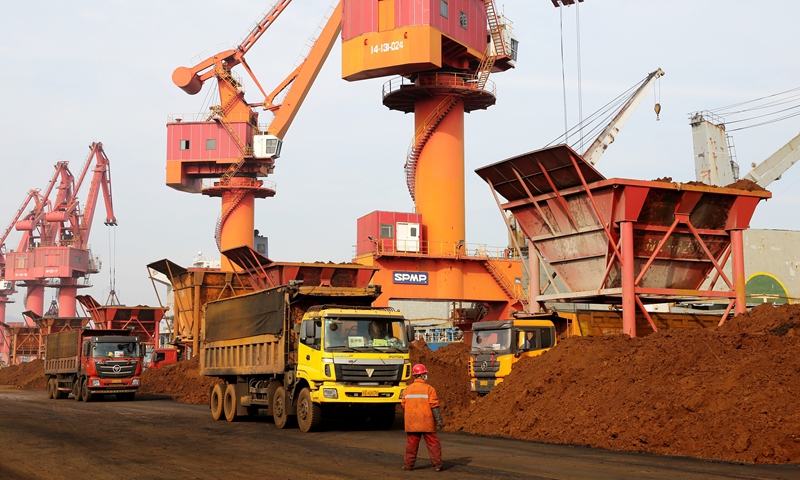
Iron ore Photo:VCG
China Baowu Steel Group Corp and the joint ventures formed by Chinese and foreign enterprises SMB Winning Consortium and Simfer, have signed an infrastructure buildup term sheet with Guinean government, reaching important cooperation consensus on joint investment and development of railways and ports of the Simandou project in Guinea, according to Baowu's Wechat account over the weekend.
The Simandou project in Guinea has the world's largest untapped iron ore reserve of high quality, with an estimated annual output of 120 million tons of capacity at the initial stage. Analysts said the deal marks a milestone in the months-long negotiation which will lay a solid foundation for the resumption and exploration of the Simandou project.
It is significant for China to diversify its iron ore import sources, which has been previously over-reliant on Australia that accounts for over 60 percent of China's total import of iron ore.
It is expected that the Simandou project, once completed, would at least double China's ore imports from Africa, drastically elevating China's pricing power at the international market, analysts said.
The deal was signed on Thursday. It represents a new development in reaching agreement on detailed terms including investment structure, funding terms, construction model and localization policy, after a joint venture La Compagnie du TransGuinéen was incorporated in July to co-develop the multi-purpose infrastructure for the Simandou project.
The project's development requires accompanying basic infrastructure, including a railway with a length of over 600 kilometers that stretches across Guinea's east and west, as well as port in the country's western coast.
In March, Guinea's government ordered the halt of all construction activities at the Simandou project, saying that it was seeking to clarify how the country's interests will be preserved, according to a Reuters report.
"The project's development will further facilitate the industrialization and economic growth of Guinea, and provide green low-carbon metallurgical furnace choice for the high-quality development of Chinese and global steel industries," Baowu said.
"The new deal is a major breakthrough that address the Guinean government's concern. It would also build a smooth industrial chain network from investing and exploring to transportation, which is beneficial for Simandou iron ore' exports," Wang Guoqing, research director at the Beijing Lange Steel Information Research Center, told the Global Times on Sunday.
Since Chinese companies have extensive investments in the Simandou project, it means China's overseas mineral interests would receive a great boost once the project enters operation, according to Wang.
She estimated that at the initial stage, iron ore shipment from the African continent would grow to 100 million tons per year, doubling from the current volume mostly from South Africa. Africa iron ore shipments currently account for about 4 percent of China's total imports.
"It would equate to a significant challenge to Australia's dominating position in China's steel industrial chain, which now accounts for around 60 percent of China's annual iron ore imports -- potentially lessening China's reliance on Australian ore," Wang noted.
In 2021, China imported 1.12 billion tons of iron ore, down 3.9 percent year-on-year, according to customs data. And about 80 percent of China's iron ore supply was imported.
The northern blocks (NO.1 and No.2 blocks) of the Simandou project is hold by SMB Winning Consortium, a consortium formed by Singapore's Winning Shipping, French transportation and logistics company UMS and Shandong Weiqiao, a leading Chinese aluminum company.
The consortium led by Baowu plans to invest in SMB Winning Consortium, and purchase 49 percent shares of SMB's two subsidiaries WCS InfraCo and WCS MineCo. The final investment of Baowu consortium is upon the approval of Chinese and Guinean governments.
The southern blocks (No.3 and No.4 block) is owned by Simfer, a joint venture with Rio Tinto Group holding 53 percent of the shares, with China's state-owned Chinalco and Baowu holding the remaining shares.




